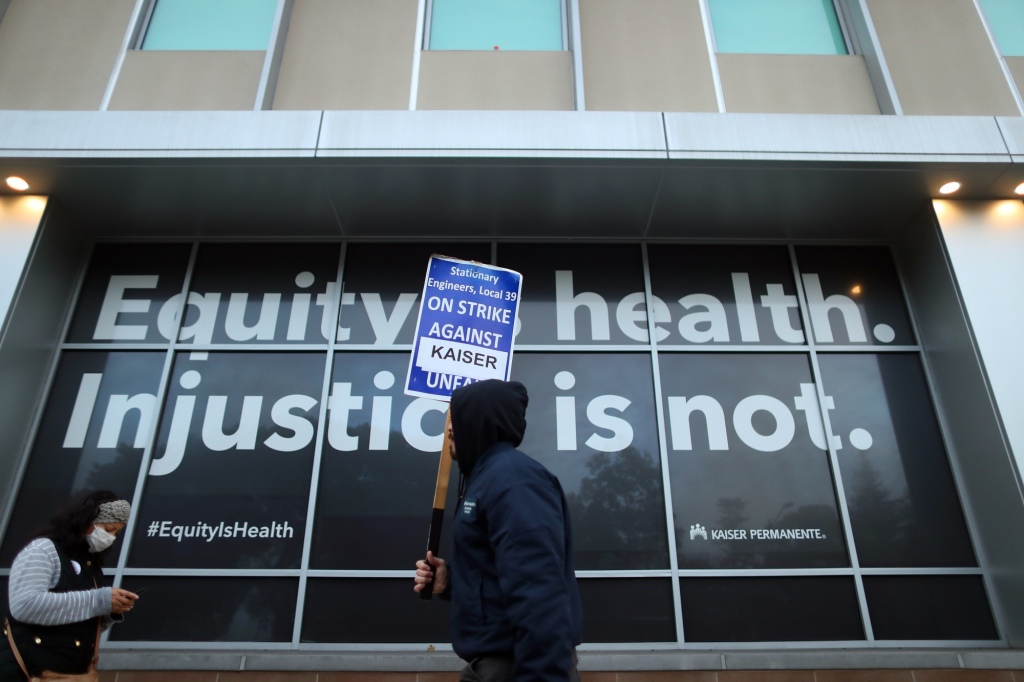After a sympathy strike on Thursday left some Kaiser Permanente patients stranded without care on Thursday, thousands of nurses and mental health clinicians will also walk out on Friday in solidarity with striking engineers.
About 20,000 nurses and thousands of mental health professionals, represented by National Union of Healthcare Workers, will picket starting between 6 a.m. and 7 a.m. at some Bay Area medical centers, including in San Jose, Fremont and Oakland. Sympathy strikers will also rally in front of Kaiser’s corporate headquarters in Oakland at noon.
“Nurses know the devastating impact that short staffing has on our community’s health and well-being,” said CNA President Cathy Kennedy, a registered nurse at Kaiser in Roseville. “We also know that in order to provide the safe patient care our communities need and deserve, we must be able to count on our coworkers and they must be able to count on us. So we are standing with the Kaiser engineers in their righteous fight for a safe and just workplace.”
The engineers, represented by IUOE Stationary Engineers, Local 39, who help maintain various systems in hospitals, medical centers, and other buildings, have been striking since their contract expired on Sept. 17 in a bid for higher wages. Kaiser said that engineers earn more than $180,000 in combined wages and benefits and that union leaders are requesting “unreasonable increases” beyond what other unions have demanded.
“I know they depict it like we’re getting paid this massive amount of money,” said picketer Elaine Lopez, a biomedical engineer at Kaiser San Jose. “This is the Bay Area, it’s not cheap to live here. All we’re asking for is what is fair. We’re not asking for anything more than that. Just what everybody else in this area is being paid in our profession.”
Mental health professionals, who have also been working under an expired contract since Oct. 1, say that Kaiser has rejected proposals to boost staffing and hire more minority and bilingual therapists in order to ease “unsustainable” caseloads at clinics. Kaiser workers say that clients are being forced to wait one to three months for a follow-up therapy appointment.
Mickey Fitzpatrick, a psychologist at Kaiser Pleasanton, said the next available appointment he has for patients isn’t until January.
“We’re grossly understaffed and have caseloads exceeding into the hundreds,” he said. “We don’t have a cap to our caseloads. It’s unethical to force clients to wait one to two months, sometimes three months for therapy appointments and it’s incongruent with their standard of care that suggests for therapy to be effective, for clients to be seen in intervals of one to two weeks.”
The long wait times could have gross ramifications on patients, including death, according to some mental health professionals.
“A month is a very long time,” said Joanna Manqueros, a therapist at Kaiser Oakland. “Depression is a serious mental health condition and just like an untreated diabetic or an untreated person with a severe cardiac condition, serious ramifications can include death and this is true for many of the mental health conditions that we treat.”
Fitzpatrick said the “vast majority” of NUHW membership would support going on strike if it came to that.
Friday’s sympathy strike comes after tens of thousands of Kaiser union workers in the Bay Area, Central Valley and Sacramento area, from X-ray technicians to housekeepers, walked out in sympathy Thursday, leaving the health care giant scrambling to find reinforcements and patients with longer wait times and in some cases, no services at all.
Kaiser said in a statement that it was bargaining with Local 39 on Tuesday and Wednesday but is still in a stalemate over wages.
“We are optimistic that we can resolve the remaining issues with Local 39 at the bargaining table and reach an agreement that continues to reward our employees and supports health care affordability, just as we have with several unions this week,” Kaiser said.
In the meantime, Kaiser said some locations with lab, optometry, and radiology services and some outpatient pharmacies will be closed or operating on reduced hours this week during the sympathy strikes. “Non-urgent” medical procedures or appointments could also be rescheduled or postponed.
The health care provider said it was questioning why union leaders have encouraged the sympathy strikes and that it “will not bring us closer to an agreement, and most importantly, it is unfair to our members and patients to disrupt their care when they most need our employees to be there for them.”
Union leaders said that Kaiser has enough money to fund resources at medical centers, which are buckling under the strain of inadequate staffing during the pandemic.
“Kaiser has the resources to be the best place to give and receive behavioral health care, but it’s chosen to be the poster child for unequal, unethical care,” said Sal Rosselli, president of the NUHW. “Kaiser’s refusal to even consider proposals to boost staffing and improve care shows that it’s not serious about working with clinicians to fix its mental health care system.”










